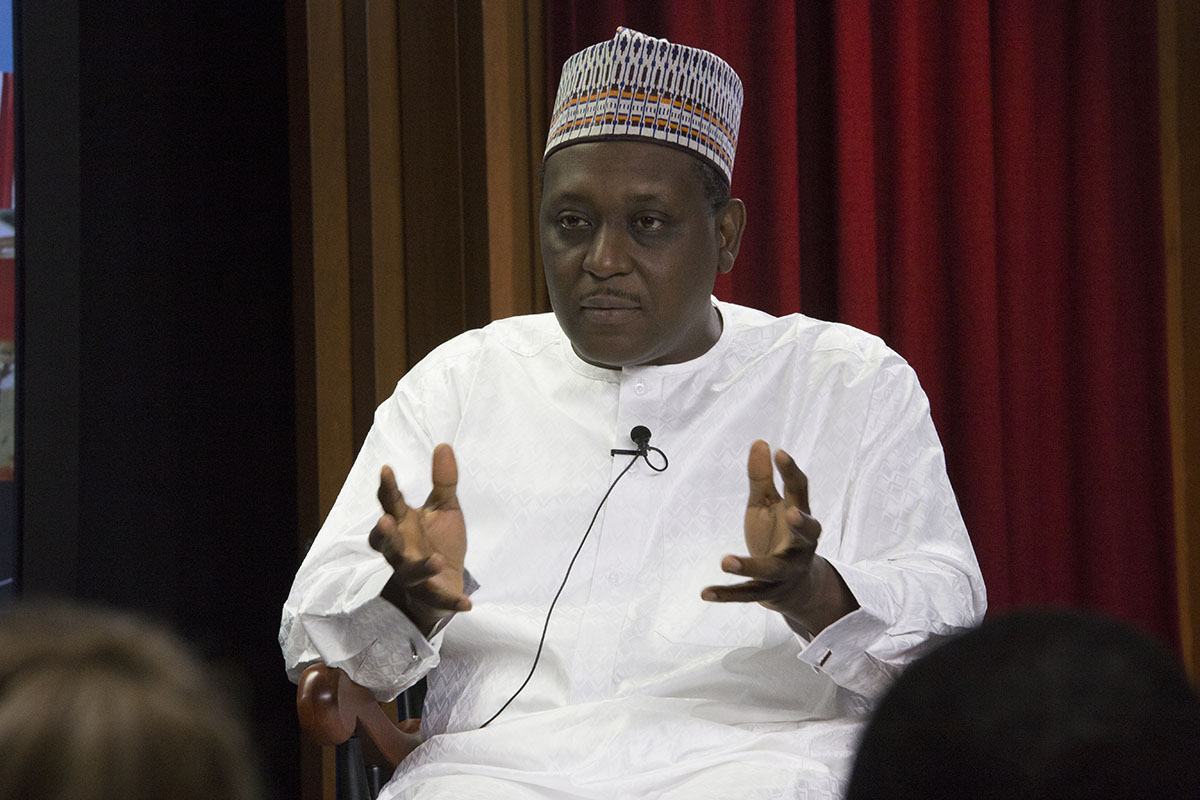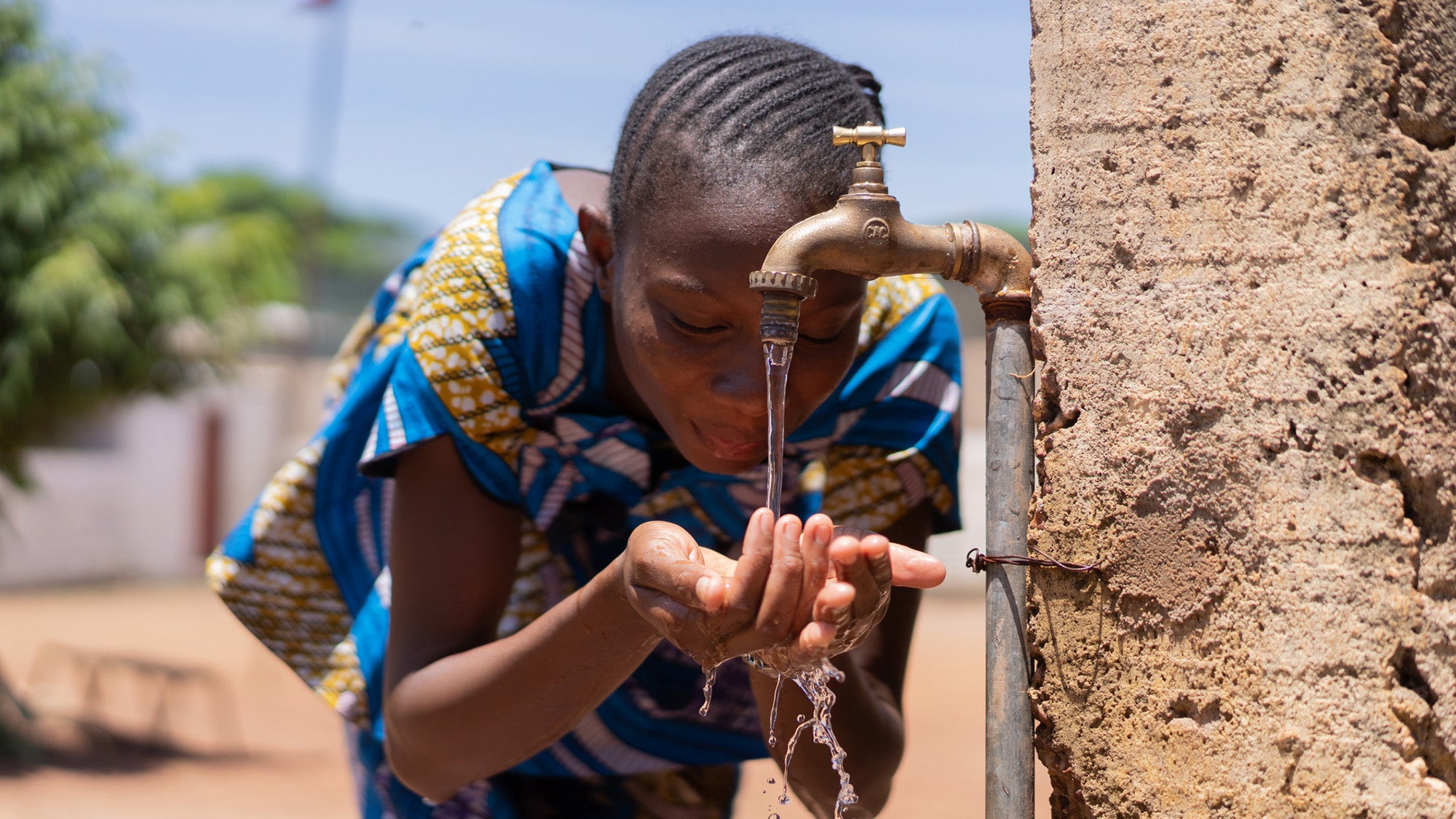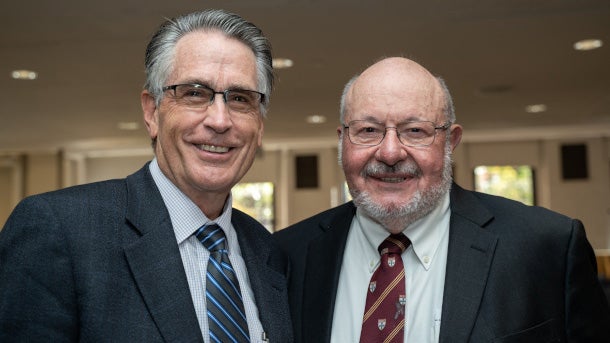A global health ‘conductor’ returns to Harvard Chan School

Muhammad Pate, a former Nigerian health minister, plans to explore trends that will shape the future of global health, and share his perspective as a practitioner
September 1, 2021—When Muhammad Pate became head of Nigeria’s National Primary Health Care Development Agency in 2008, the country was in the midst of a polio epidemic. During the first two years of his leadership, cases dropped dramatically from 798—the highest in the world at the time—to just three. It was a hard-fought turnaround that put Nigeria on the path to being declared free of the wild poliovirus by the World Health Organization in August 2020.
Pate’s approach was multi-pronged, mobilizing more resources to struggling areas and, crucially, gaining trust in communities. He described the campaign in a 2016 Voices in Leadership talk at Harvard T.H. Chan School of Public Health when he was a Menschel Senior Leadership Fellow, likening his role to that of a conductor. Leaders don’t play the instruments, he said. They provide the resources so that the players can do their best. “You look at the composition and you orchestrate it such that you have harmony. Or if you don’t do it well, you have noise.”
Now, after several years working in philanthropy and in policy at the World Bank, Pate is back at Harvard Chan School. He began his appointment as Julio Frenk Professor of the Practice of Public Health Leadership, in the Department of Global Health and Population, in July, and said that he looks forward to sharing his perspective as a practitioner. “What I hope to contribute to this School is the ability to examine, based on experience, the big trends in the global health landscape that will be shaping the future of practice itself—in governance, leadership, finance and innovations in health systems, and topical issues such as climate change and hygiene, and pandemic preparedness—and to build that into a program of research collaborations, seminars, and courses,” he said.
Convening community, gaining trust
Born in a family of herders, Pate was among the first in his extended family to receive good quality education. He went on to become a physician, trained in the U.S. in internal medicine and infectious diseases, and earned an MBA from Duke University and a master’s in health system management from the London School of Hygiene & Tropical Medicine.
These opportunities were a privilege Pate did not take lightly. He felt an obligation to use his education to make society better, he said. “Medicine and public health offered me a path to contribute to alleviating the pain, suffering, and disease that I saw.”
Early in his career, he served as a medical officer in Nigeria and with the British Medical Research Council Laboratories in The Gambia, before joining the World Bank as a senior public health specialist overseeing programs in Africa and the East Asia and Pacific region.
As he moved into public health leadership roles in Nigeria, Pate put into practice the lessons he learned growing up within a pastoralist community. As he described in his 2020 graduation speech at Harvard Chan School, herders have understood for millennia, “that simple but powerful notion that we are all interconnected—humans, animals, pathogens, and our global environment.” Herders must earn the trust of their flock and their community, he said, and move everyone towards a shared goal.
When he launched his campaign to increase childhood polio vaccinations, Pate knew that he would need to win over the local leaders whom communities trusted. Persuading tribal leaders to endorse the campaign was particularly important, Pate said. Although polio was endemic in the country, it was rare enough that many people had never witnessed the suffering it caused. Other sources of poor health and disease were much more apparent, and this made some people suspicious. Pate was able to win over leaders by being transparent with information and involving them in planning the campaigns in their communities—which ultimately led to parents feeling more confident about vaccinating their children.
As more than 250 local governments around the country began mobilizing hundreds of thousands of health volunteers to immunize children, Pate visited sites across all 36 states. He was always willing to discuss concerns with members of the community, including a man who was prepared to fight health workers to keep them from vaccinating his children. When the man felt heard after voicing his concerns about his neighborhood’s lack of other health services he relented, Pate said.
Pate was well aware that limited access to care was a big problem in his country. Addressing polio—which he saw as a symptom of the system’s failings—was just part of Pate’s vision for reform. He worked to address areas of greatest need in primary care, for example, bringing in more midwives to attend births at health centers. When he became Minister of State for Health in 2011, Pate established a global coalition of private and public partners to support health system improvements, and implemented innovative programs to tackle priorities, including prevention of mother-to-child transmission of HIV to save one million lives (the Nigerian Saving One Million Lives Initiative).
A launch pad for more equitable systems
Marcia Castro, Andelot Professor of Demography and chair of the Department of Global Health and Population (GHP) at Harvard Chan School, praised Pate’s contributions to strengthening the health system in Nigeria. She added, “Globally, his work has contributed to improving the quality of health care and reducing preventable deaths. His experience and leadership aligns with GHP’s mission to improve global health through education, research, and service from a population-based perspective.”
In his most recent role before returning to the School, Pate worked on the World Bank’s strategy for financing population health programs. In his first months on the job, Pate helped the organization focus its capabilities on helping client countries build their health systems, particularly around primary care and public health. As the COVID-19 pandemic grew, he and World Bank colleagues pivoted to supporting the emergency response, providing an initial six billion dollars across 100 countries from April to June 2020. Later, the World Bank approved additional financing of $12 billion to support vaccine accessibility and delivery in countries around the world.
“It is quite a privilege to have had the opportunity to contribute in that effort during the pandemic and then to begin laying the foundations for future preparedness and resiliency as countries rebuild,” Pate said. Furthering this work is front and center as he settles into Harvard Chan School and looks to the challenges ahead in global health. “What we’ve experienced during the pandemic can become a launch pad for building more equitable systems, for protecting lives, and improving the health of populations all over the world.”
Photo: Sarah Sholes


